|
Mountain Bike Frame Categories &
Disciplines:
Below is a broad-spectrum of design
categories and riding disciplines that mountain bikes/bikers fall into for
the general public. Please be aware that the information below does not
cover all aspects of mountain bike design and disciplines, but provides a
baseline to understand the basic difference between each bike type below.
Frame Categories: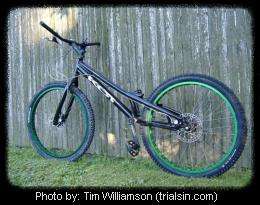
Many riders know that mountain bikes
are split into 4 main design categories. Each category offers a unique set
of design challenges for the manufacture since today, the design category
does not determine the riding discipline. An example of this design
challenge is you will have riders using full suspension bikes for downhill
racing; however you will also have riders using hardtails for the same
purpose. This stated fact has made the industry design a number of specific
frames for a specific use. However, regardless how many different frames
are created, they generally fall into one of the 4 main categories below.
Fully Rigid -
This is a mountain bike that has no front
or rear suspension. In some cases, the bike frame is design only for rigid
use where front suspension would make the bike ride and feel unstable due to
its geometry.
Hardtail -
This is a mountain bike with no rear suspension, but is designed for the use
of a front suspension fork. The range of suspension travel will be
determined by frame geometry, but in many cases, you can convert a hardtail
to a fully rigid with minimal problems.
Full Suspension -
This is a mountain bike with both front and rear suspension. The bike
consists of a frame and rear linkage with single or multiple pivot points to
allow movement of the rear wheel. Again, the range of suspension travel
will be determined by frame geometry.
Soft Tail -
This is a mountain bike design that is rather unique and a cross between a
hardtail and full suspension bike. Soft tail bikes have very small amounts
of rear suspension that is controlled by flexing the frame rather then
utilizing a rear pivoting linkage.
Bike Frame Oriented Disciplines:
Mountain bike frames fall into several
different disciplines that are usually defined by the type of terrain, not
the rider. This is not to be confused by a "Rider" selected discipline
which is completely different in respects to the design and build of a
mountain bike. An example of this statement is that; a person whom
practices the discipline of "Trials" can ultimately perform many aspects of
this discipline on a number different bikes (i.e. XC, Freeride, etc)
however, the bike selected may not be designed to handle the related frame
stress that would be endured during such maneuvers.
With that said, all of the above frame
categories fall into one or more of the following disciplines listed below.
We have not covered all related bike disciplines, just the majority of what
we see when riding in the woods.
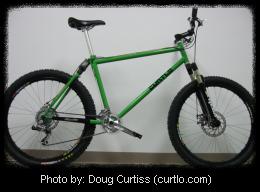
Cross Country (XC) -
Mountain bikes that fall into this discipline are designed around two main
factors; weight and pedaling efficiency. Many of these bikes are designed
with relatively small amounts of suspension (front and rear) and have steep
head and seat tube angles to allow a more forward leaning body position
during riding. They are typically fabricated from Aluminum, Carbon-fiber
and/or bi-metal mixtures to achieve the lightest possible frame but maintain
strength for its design purpose. Cross country bikes typically have 3
selectable front sprockets along with a 9 speed (cog) rear cassette allowing
for a huge variation of pedal torque vs. gear inch travel.
Below is a
typical bike build for XC frames that are oriented for this riding
discipline:
-
Frame Design:
Typically Full Suspension.
-
Frame Geometry:
Head Tube Angle 70 degree; Seat Tube Angle 73 degree; Wheelbase 43 inches.
-
Average Build Weight:
20 to 30lbs depending on component selection.
-
Suspension Travel:
3 to 4 inches for both fork and rear shock.
-
Suspension Type:
Air fork and rear shock.
-
Wheel Setup (Front): Lightweight XC
rim with 32 hole QR hub.
-
Wheel Setup (Rear): Lightweight XC
rim with 32 hole QR hub.
-
Tire Size Range:
1.9 2.3 with a durometer of 65 (average).
-
Brakes: Cable brakes with 6 inch
disk rotors (front & rear).
-
Crank Arms: 175mm 180mm
-
Chainring: Three sprocket setup
ranging from 24t ~ 48t.
-
Rear Cog Set: 9 speed cassette
ranging from 11t ~ 32t.
-
Stem Length: 70mm ~ 130mm; 6 degree
rise (average).
-
Handle bars: 23" 25" width; 0" to
1.5" rise; 5 degree rearward & 4 degree upward sweep (average).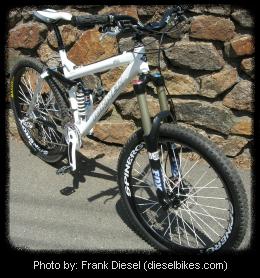
All-Mountain (AM):
Mountain bikes that fall into this discipline are a cross between XC bikes
and FR bikes. They are designed for efficient pedaling but have slightly
heavier frames to handle more aggressive technical riding that may involve
jumps. AM bikes tend to have greater suspension then XC bikes and many
include multiple positions for different rear shock lengths. AM frames
are heavier due to thicker gauge tubing and/or frame gusseting.
Typically these frames are designed to have 3 selectable front sprockets
along with a 9 speed (cog) rear cassette allowing for a huge variation of
pedal torque vs. gear inch travel.
Below is a typical bike build for AM
frames that are oriented for this riding discipline:
-
Frame Design: Typically Full
Suspension.
-
Frame Geometry:
Head Tube Angle 68 degree; Seat Tube Angle 73 degree; Wheelbase 45 inches.
-
Average Build Weight: 28 to 35lbs
depending on component selection.
-
Suspension Travel: 4 to 6 inches for
both fork and rear shock.
-
Suspension Type: Air fork and rear
shock. Coil suspension is optional.
-
Wheel Setup (Front): All-purpose rim
with 32 hole QR hub.
-
Wheel Setup (Rear): All-purpose rim
with 32 hole 10mm bolt-on hub.
-
Tire Size Range: 2.25 2.5 with a
durometer of 65 (average).
-
Brakes: Hydraulic brakes with 6 inch
disk rotors (front & rear).
-
Crank Arms: 175mm.
-
Chainring: Three sprocket setup
ranging from 22t ~ 46t.
-
Rear Cog Set: 9 speed cassette
ranging from 12t ~ 34t.
-
Stem Length: 50mm ~ 90mm; 6 degree
rise (average).
-
Handle bars: 24" 26" width; 0" to
1.5" rise; 5 degree rearward & 4 degree upward sweep (average).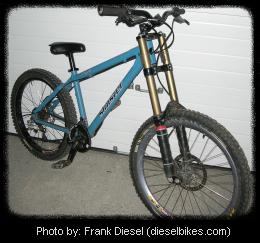
Freeride (FR):
Mountain bikes that fall into this discipline are designed to handle the
stress of large jumps and extreme technical riding. FR mountain bikes are
probably the most versatile bike for aggressive technical riding. With
todays suspension technology and rear linkage designs, FR bikes are
somewhat capable of being ridden uphill and are moderately maneuverable at
low speed regardless of a "slack" riding position. FR bike typically
run just one sprocket in the front with a 9 speed cog set in the rear.
This is to reduce the overall length of the chain which will reduce the
possibility of chain slap and miss-shifting during travel of the rear wheel.
Below is a typical bike build for FR
frames that are oriented for this riding discipline:
-
Frame Design:
Typically Full Suspension.
-
Frame Geometry: Head Tube Angle 66
degree; Seat Tube Angle 71 degree; Wheelbase 45.5 inches.
-
Average Build Weight: 32 to 45lbs
depending on component selection.
-
Suspension Travel: 6+ inches for
both fork and rear shock.
-
Suspension Type: Air fork and rear
shock. Coil suspension is optional.
-
Wheel Setup (Front): Heavy-Duty rim
with 36 hole 20mm hub.
-
Wheel Setup (Rear): Heavy-Duty rim
with 36 hole 10mm bolt-on hub.
-
Tire Size Range: 2.5 2.7 with a
durometer of 60 (average).
-
Brakes: Hydraulic brakes with 8 inch
disk rotors (front & rear).
-
Crank Arms: 170mm.
-
Chainring: Single sprocket setup
ranging from 32t ~ 46t.
-
Rear Cog Set: 9 speed cassette
ranging from 12t ~ 34t.
-
Stem Length: 30mm ~ 70mm; 10 degree
rise (average).
-
Handle bars:
24" 27" width; 1.5" to 2.5" rise; 9 degree rearward & 4 degree upward
sweep (average).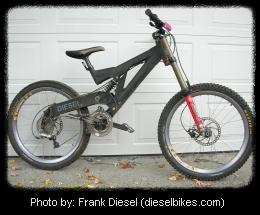
Downhill (DH):
Mountain bikes that fall into this discipline are designed for handling
extreme technical riding at high speed. Typically with 8 inches of
travel, DH bikes can handle the biggest jumps, steepest descents and most
technical rock gardens that you have the balls for. Designed with a
long wheelbase and "slack" rider position, a DH bike is not ideal for riding
general trails in the woods, but will serve its purpose when you transverse
trails on an exclusively lift accessed terrain.
Below is a typical bike build for DH
frames that are oriented for this riding discipline:
-
Frame Design: Typically Full
Suspension.
-
Frame Geometry:
Head Tube Angle 64 degree; Seat Tube Angle 65 degree; Wheelbase 47 inches.
-
Average Build Weight: 35 to 60lbs
depending on component selection.
-
Suspension Travel: 6 - 8+ inches for
both fork and rear shock.
-
Suspension Type: Coil/oil fork and
rear shock. Air is optional.
-
Wheel Setup (Front): DH rim with 36
hole 20mm hub.
-
Wheel Setup (Rear): DH rim with 36
hole 10mm bolt-on hub.
-
Tire Size Range: DH2.3 3.0 with a
durometer of 50 (average).
-
Brakes: Hydraulic brakes with 8 inch
disk rotors (front & rear).
-
Crank Arms: 170mm.
-
Chainring: Single sprocket setup
ranging from 32t ~ 48t.
-
Rear Cog Set: 9 speed cassette
ranging from 12t ~ 34t.
-
Stem Length: 30mm ~ 70mm; 10 degree
rise (average).
-
Handle bars: 26" 28" width; 1.5"
to 2.5" rise; 9 degree rearward & 4 degree upward sweep (average).
By: Diesel
Date: 01/31/2007 |